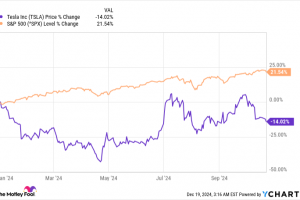
Since the start of 2023, the Nasdaq Composite is up a blistering 72%, while the S&P 500 has achieved an impressive 45% gain. Some investors may feel that the market is overextended.
Aside from many stocks fetching higher than historical valuations, there are plenty of economic indicators — from U.S. money supply to the state of the housing market and the consumer — that indicate the market could be poised for a sell-off or even a correction.
Here are three mistakes to avoid in the second half of 2024 and how you can prepare for whatever the market brings for the rest of the year.
Image source: Getty Images.
1. Overhauling your portfolio
One of the worst decisions you can make is changing your investing strategy and portfolio based on emotion. Even if the stock market sells off, history shows that holding through periods of volatility is a winning strategy. The Nasdaq Composite and S&P 500 suffered brutal downturns in 2022. But in the time since then, both indexes have more than made up for those losses.
Even if an investor had a crystal ball and knew the market was going to sell off, it still would have been better to endure the downturn rather than sell and never get back in. The reason why timing the market is a bad idea is that you have to be right twice — knowing when to sell and when to buy. On the other hand, buying and holding quality companies requires only one good decision.
Now is a good time to conduct a portfolio review and make sure your investments align with your risk tolerance. When a certain sector or theme drastically outperforms others, it can completely change the allocation of a portfolio. For example, if you owned even a small position in stocks like Nvidia or Meta Platforms that have increased several-fold over a relatively short amount of time, those companies would likely have become much larger positions on a percentage basis.
Of course, you could trim the position to reduce the weighting. But another solution is to shift the way that you allocate new capital. Investors who regularly contribute new savings to their portfolios can simply…
..






